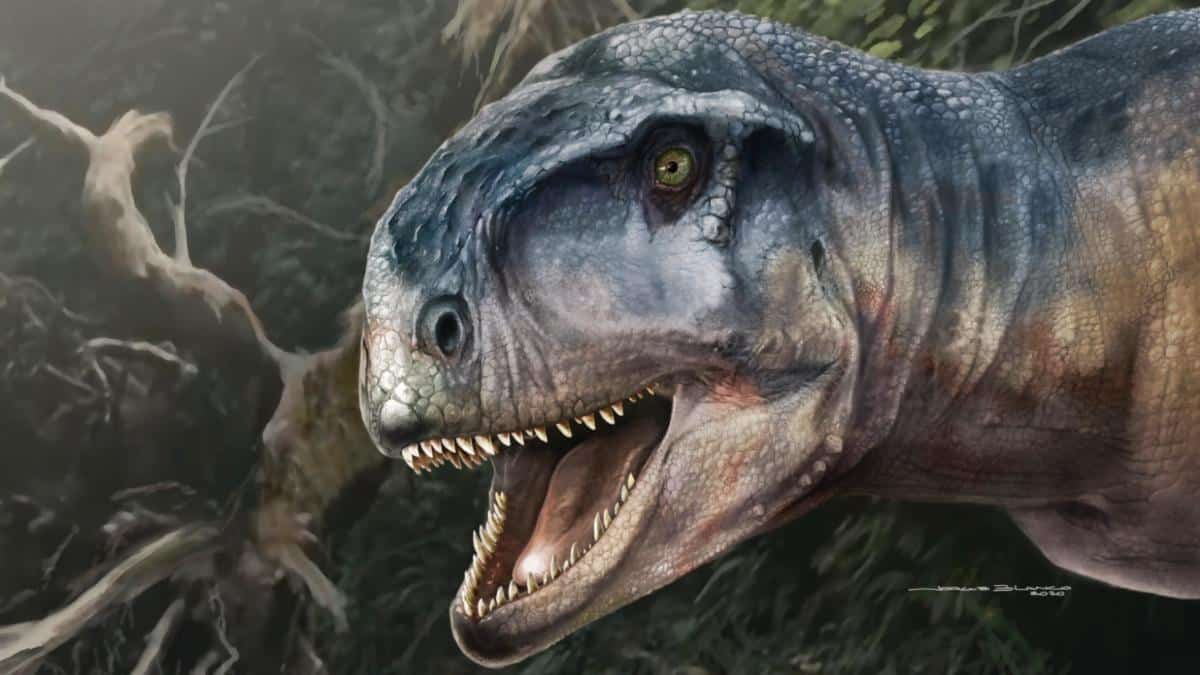

An artist''s impression of Llukalkan aliocranianus. JORGE BLANCO AND JOURNAL OF VERTEBRATE PALEONTOLOGY
Move over, Tyrannosaurus rex! There’s a new top dinosaur in town.
Scientists have discovered a new species from the abelisauridae family of predatory dinosaurs in Argentina and named it the “one who causes fear.”
“This is a particularly important discovery because it suggests that the diversity and abundance of abelisaurids were remarkable, not only across Patagonia, but also in more local areas during the dinosaurs’ twilight period,” lead author and National University of San Luis, Argentina paleontologist Dr. Federico Gianechini said in a press release.
Abelisaurids were a dinosaur family that lived throughout contemporary South America, Africa, India, Australia and Antarctica around 80 million years ago. They were similar in appearance to T. Rex, with the same infamously short arms. However, they had unique skulls that were both short and deep, with crests, bumps and horns.
The new dinosaur had an especially remarkable skull, and that is reflected in its name: Llukalkan aliocranianus. While Llukalkan means “one who causes fear” in the language of Patagonia’s Indigenous Mapuche community, aliocranianus means “different skull” in Latin, according to a write-up of the discovery published in the Journal of Vertebrate Paleontology Tuesday.
The new dinosaur would have been about as long as an elephant, with sharp teeth, a powerful bite and large claws on its feet, according to the press release. However, its different skull shape would have made it an even more fearsome predator. It had an air-filled sinus in its middle ear zone that would have given it different, and probably superior, hearing to other abelisaurids.
“A peculiarity of this dinosaur is that it has cavities in the ear area that other abelisaurids did not have, which could have given this species different auditory capacities, possibly a greater hearing range. This, together with its keen sense of smell, would have given great capabilities as a predator to this species,” Gianechini told CNN.
Its hearing would have been about as good as today’s crocodiles, the researchers thought.
The new dinosaur was discovered by accident in 2015. Researchers were working in La Invernada, near the city of Rincón de los Sauces in Argentina’s Patagonia to unearth a plant-eating sauropod dinosaur and noticed the predator’s bones sticking out towards the end of their dig. It was also discovered 700 meters (approximately 2,296 feet) from another abelisaurid called Viavenator exxoni, HuffPost reported.
There are now nearly 10 known species of abelisaurid, according to the press release, but the researchers said that there are likely more waiting to be unearthed. And they were thriving until dinosaurs were wiped out 67 million years ago, CNN noted.
“These dinosaurs were still trying out new evolutionary pathways and rapidly diversifying right before they died out completely,” co-author Dr. Ariel Mendez from the Patagonian Institute of Geology and Palaeontology, Argentina said in the press statement.
- Groundbreaking Fossil Shows Prehistoric 15-Foot Reptile Tried to ...
- Skull of Smallest Known Dinosaur Found in 99-Million-Year Old ...
- New Dinosaur Fossils Could Belong to Largest Creature to Walk on ...
- 'Cold Bone': New Dinosaur Species Discovered in Greenland - EcoWatch

 233k
233k  41k
41k  Subscribe
Subscribe 